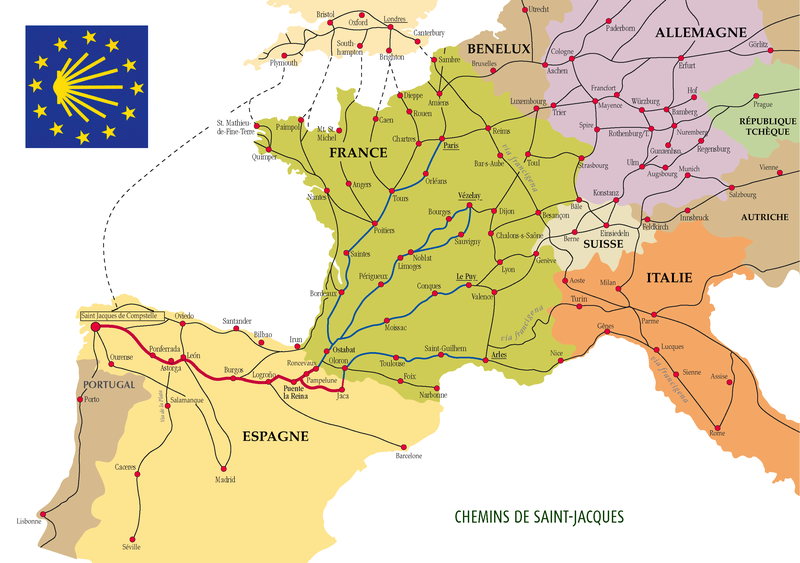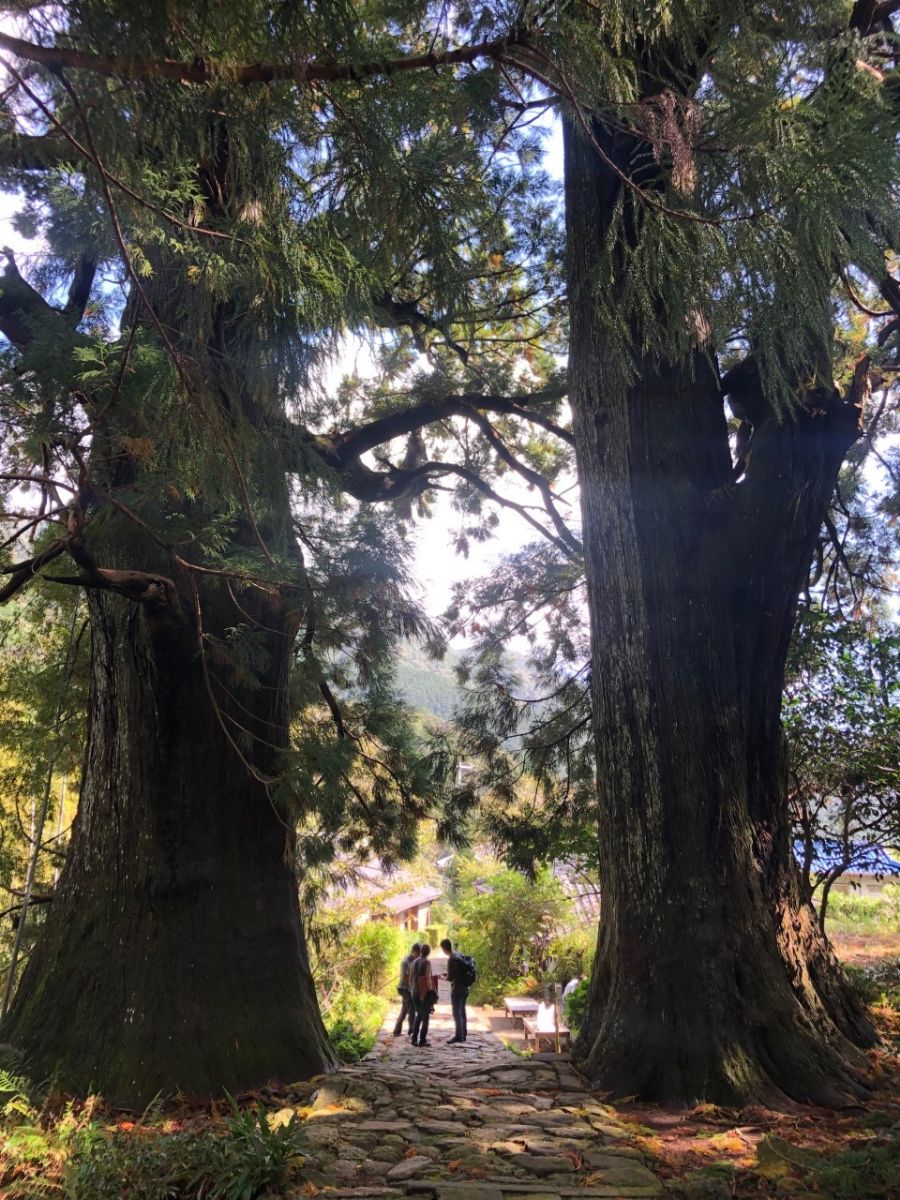Camino de Santiago
Key information: Camino de Santiago 
- Famous network of routes across Europe, converging on northern Spain, all leading to the Catholic pilgrimage site at Santiago de Compostela.
- Choice of routes all several hundred kilometres passing through varied countryside.
- Meander across plains, crossing beautiful, remote mountain ranges.
- Stay in villages and towns along the way. Examine a plethora of cultural gems.
- End up in the great pilgrim city of Santiago deeply spiritual for some, moving and thought-provoking for all.
Walkopedia rating
(Top 100)
- Walkopedia rating89
- Beauty31
- Natural interest15
- Human interest16
- Charisma31
- Negative points4
- Total rating89
- Note: Negs: popularity, you are seldom alone
Vital Statistics
- Length: 6 weeks - single day
- Maximum Altitude: n/a
- Level of Difficulty: Variable

WALK SUMMARY
The Camino de Santiago is actually not one trail, but dozens, leading across Europe and converging on the Christian pilgrimage site, the stunning Santiago de Compostela, in Galicia, Northern Spain.
Within Spain, there are a dozen official routes, the most-walked of which, The Camino Frances, covers some 780km from St. Jean-Pied-du-Port, near Biarritz, France, to the shrine. Though it reached the height of its popularity between the twelfth and fourteenth centuries, archaeology shows that there has been a pilgrimage route here from prehistory, and the Roman trade route to the Atlantic, the via Lactea, also followed, roughly, the Camino Frances. Its religious use had all-but died out by the 1980s, and was, ironically, revived by the paths increasing popularity with leisure walkers, now hosting some thousands of pilgrims each year once more.
Being so long and so varied, this is a hard route to sum up, except in terms of its extraordinary historical significance. Its many branches, well-marked with bright yellow arrows and scallop shell motifs, afford experience of everything Northern Spain has to offer, from great historic cities, through wild mountain landscapes, the hot central plain, the delightful wine country of the Rioja, bucolic farming idylls, rough coastal paths and small-town treasures, to the blowsy, elegant faade of the reputed burial-place of St James, who, almost single-handedly, apparently, drove the Moors from Spain several centuries after his death.
See our dedicated pages for the main routes, which include:
- The Camino Frances.
- The Camino del Norte, which follows the northern coast, north of the stunning Picos de Europa.
- The Via de la Plata, the ancient route northward through Spain.
- The Camino Portuges (starts in Portugal)
- The Chemin St Jacques de Compostelle (routes through France)
Other routes, which we plan to write up over time, include:
- The Camino Finisterre: after visiting Santiago de Compostela, many pilgrims then take the opportunity to do the three-day walk, via Negreira and Olveiroa on to Finisterre which, as it name suggests, was widely thought to be the end of the world in ancient cultures (though in fact Portugal boasts Europes most westerly promontory). This is a lovely, green, 81km walk, far less populous than the Camino Frances, but refugios are rather inadequately placed, meaning that it has to be divided into one easy, flattish day of 21km and two quite punishing, more uphill, days of 30km. Being easily accessed by bus, Finisterre itself is quite crowded but its great western sunsets are justifiably famous.
Map of the Ways of St James in Europe
Source: Manfred Zentgraf, Volkach, Germany; licensed under Creative Commons Attribution-Share Alike 3.0 Unported at Wikipedia.org.
Other accounts: share your experiences
Your comments on this walk, your experiences and suggestions, and your photos are very welcome. Where appropriate, you will be credited for your contribution.

We have a lot of helpful practical information and tips about this walk, covering everything from the best books and maps, to timing and weather, geting there, possible problems, whether you need a guide and where to find them, and useful websites. This section is only open to members.
Membership is FREE AND JOINING TAKES 30 SECONDS. To login or sign up click here
Safety and problems: All walks have inherent risks and potential problems, and many of the walks featured on this website involve significant risks, dangers and problems. Problems of any sort can arise on any walk. This website does not purport to identify any (or all) actual or potential risks, dangers and problems that may relate to any particular walk.
Any person who is considering undertaking this walk should do careful research and make their own assessment of the risks, dangers and possible problems involved. They should also go to “Important information” for further important information.
Anyone planning an expedition to this place should see further important information about this walk.
Safety and problems: All walks have inherent risks and potential problems, and many of the walks featured on this website involve significant risks, dangers and problems. Problems of any sort can arise on any walk. This website does not purport to identify any (or all) actual or potential risks, dangers and problems that may relate to any particular walk.
Any person who is considering undertaking this walk should do careful research and make their own assessment of the risks, dangers and possible problems involved. They should also go to “Important information” for further important information.
COMMUNITY COMMENTS AND PHOTOS
Name: Administrator
Posted on: 22/09/2011
We'd like to hear from the Walko friend who contributed this, but, anonymity.
Name: caminotravel
Posted on: 04/03/2013
I'm from Spain, and i Love the Camino. I would like to contribute with my experince
Name: senderismoytrekking
Posted on: 03/02/2015
List of Guided Tours at Camino de Santiago: http://senderismoytrekking.com/senderos/caminosantiago/caminos-de-santiago
Name: xrimichii
Posted on: 05/12/2017
There are many different routes to get to Santiago de Compostela. Generally the most popular are also the most crowded and declared official routes. However, there are some secondary routes that lead to the main Caminos.
Name: slaclau
Posted on: 09/07/2018
I love walking the Camino de Santiago, specially the Camino del Norte as I think its the most beautiful Camino, specially during the summer.
Name: slaclau
Posted on: 09/07/2018
Try https://santiagoways.com/en to book the Camino de Santiago
Name: Administrator
Posted on: 29/11/2018
Nicky Basford says: “In July 2015 I walked part of the Camino de Santiago pilgrimage route, starting from the French side of the Pyrenees crossing into northern Spain. Not only was I struck by the extraordinary heat, temperatures reached 100 degrees some days, but also the humbling and challenging experience of journeying for miles each day, accepting all the inevitable discomfort in order to be just a little nearer to your destination at the end of it. Small comforts became large, like a tree offering shade in an otherwise barren landscape. The parched cardoons, or artichoke thistles, by the roadside began to feel like metaphors and the sun-baked ‘way’ stretching into the distance, a reminder of my journey towards something, of pilgrimage.” Nicky Basford, painter. www.nickybasford.co.uk

OTHER ACCOUNTS
share your experiences
Add your experiences, suggestions and photos. We would be delighted to receive your writing and ideas (which will be attributed appropriately where published).
Anyone planning an expedition to this place should see further important information about this walk.

Responsible travel matters, a lot. How you travel will make a real difference - for better or worse. PLEASE consider this when making plans. Read more
















